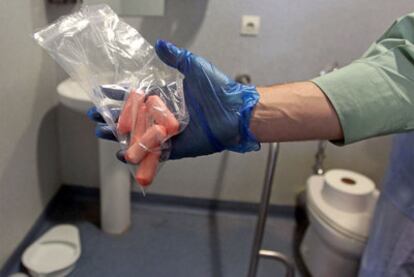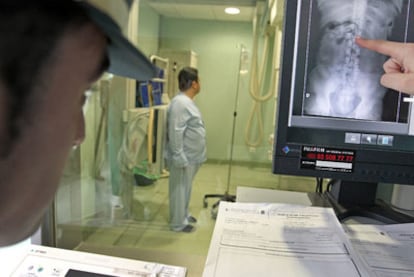The deadly risks of the 'boleros'
The men and women who smuggle drugs hidden inside their bodies are facing more than just a 10-year jail sentence for their crimes
I t doesn't take the chief inspector of the Drugs Unit at Madrid's Barajas airport more than a couple of minutes to persuade the suspect, a Colombian man posing as a local government official, that the game is up.
"You can see there, and there, a few strange objects, says the officer, holding an X-ray up to the light in his office at Terminal 1.
"They look like capsules," he adds. The man pauses, and the smile he has been trying to maintain during the brief conversation slips momentarily into a grimace. "I don't have anything there," he says, breaking into a sweat, before asking for a glass of water. "Sure," says the officer, "but only a drop. It's dangerous to drink when you are carrying what you and I both know you are carrying inside you." The man smiles again; he seems almost relieved as he is charged with drug trafficking.
The authorities at Barajas say that last year they arrested more than 150 boleros, the Spanish name given to the men and women who attempt to smuggle drugs inside their bodies - usually liquid cocaine contained inside condoms.
"These people are taking a tremendous risk," says the chief inspector, after the man has been taken to hospital. "If one of those bags of liquid cocaine bursts, he'll be dead in minutes."
He turned out to have some 40 condoms in his stomach, containing 1.5 kilos of cocaine. He was taken to Madrid's Ramón y Cajal hospital, one of two in the capital that have set up special units to deal with boleros.
The boleros are held under police guard in special rooms, both to prevent them escaping, and to protect them from the gangs that organize their trips to Spain.
Typically, the boleros will spend around four days in the UVU, the Unidad de Vigilancia de Urgencias (Emergency Observation Unit) waiting until they expel the condoms.
And every time they go to the bathroom, they are accompanied by a police officer. When they arrive at the hospital they are given a mild laxative, and are only allowed to ingest liquids. The medical staff then collect the condoms and hand them over to the police. One woman here has swallowed 100 condoms, and has been in the unit for two days. According to the medical team's records, she has now expelled all the drugs. But she will have to defecate another 10 times to make sure that everything has left her body. She will then be given another X-ray, before being charged and held in jail until her trial, which may not reach court for years.
Two uniformed civil guards bring in another bolero, a 39-year-old man detained at the airport. His X-rays reveal that he is carrying, but he will be given a second X-ray in the hospital. While he is waiting, he says he needs to go to the lavatory. He is accompanied by one of the officers. Five minutes later the officer returns with a small bag containing five condoms. The procedure is simple. The patient defecates onto a small wire tray placed inside the toilet, and then washes the condoms and hands them to the nurse or police officer.
Like all the other boleros, the man will remain here until he has expelled all the condoms. He will not only be under police observation, but also monitored by the medical staff.
"When one of these bags breaks in the intestine, we have just a few minutes to act," says Julio Cobo, the head of the unit. If the boleros are carrying liquid cocaine, there is almost nothing that his team can do. "Death is almost instantaneous," he says. "Sometimes, the bags break while the carrier is still on the plane, in flight, and they die right there." He explains that the liquid is absorbed by the intestine, and then passes directly into the bloodstream, without even reaching the liver. A condom will typically contain 10 grams of 80-percent-pure cocaine. "It is quite simply a massive overdose," says María Jesús Estévez, who manages the UVU.
She says that her unit has not had a fatality since September 2006, but adds that two out of every 100 drug traffickers that end up under team's charge have serious medical problems as a result of having ingested condoms filled with cocaine, either when the condoms break, or from intestinal blockages. In the case of powdered cocaine, the team has to deal with rapid heart acceleration, sweating, soaring blood pressure, and convulsions, and must act within minutes. Or, as Antonio Mena and Irene Moreno explain, the patient will typically suffer a massive heart attack. "They are told by the gangs who send them here that the condoms cannot break. But we know from experience that they do," says Cobo.
The medical staff at the UVU say that many of the men and women under their care suffer an emotional breakdown during their confinement, and say that they are unaware of what they are carrying. "Less than 30 percent are able to tell us exactly what it is they have swallowed. Some of them think that once they have expelled the condoms they will be allowed to go home. And when you tell them that they are going to be charged with drug trafficking, they break down and cry. Most of them spend the whole time here crying," says Estévez.
She says that 80 percent of the boleros are from South America, with the remainder from Eastern Europe. They are typically from lower down the social scale, and rarely use drugs themselves. In recent years, there has been a growing number of families involved. "A mother and her two sons, a father and a son, and a lot of couples," says Estévez.
She says that the average number of condoms the boleros swallow is around 54, but that there have been cases of women carrying up to 80, and men that have ingested 130.
Once he has returned from the bathroom, the latest arrival is given an X-ray, although there is now no doubt that he is carrying. He is then put under guard. The officer that brought him in is new to the job, and this is his first detention. He says that he was aboard a flight from Bogotá, and noticed the man behaving suspiciously.
The Civil Guard and drugs unit police regularly place officers aboard flights from Colombia, Bolivia, Ecuador, Peru and Mexico, as well as from West Africa, which has become a major staging post for the South American cartels.
"I noticed that he wasn't in a very good state; his eyes were bloodshot, and when I spoke to him his breath stank," says the officer. By the time the boleros arrive in Madrid, he explains, they have not eaten or drunk for at least two days. They have swallowed the condoms - another method is to use the fingers of latex gloves - the day before boarding the flight. By the time they arrive in Spain they are dehydrated and starving.
"You look at their passport, to see which countries they have visited. You look to see if they are here on vacation and for how long, and if they are coming through another country," he says. "This guy had no suitcase, and no luggage of any kind. And that is suspicious. A lot of these people owe money, and are desperate. You feel sorry for them, because they have been tricked, especially the older people." He says that in recent years more and more people from Romania and other countries in Eastern Europe are being used as drug mules. They are relatively easy to spot, because they have first traveled to South America, to pick up the drugs.
A flight is about to arrive from Mexico. Six or seven officers head out to the passport control area to watch the arriving passengers. It is hard to know what the officers base their suspicions on. Nobody looks guilty as they pass through the baggage collection area. "It's about experience, about intuition," says the chief inspector of the Drugs Unit. "Most of the boleros are normal people, with no criminal record. They end up working for these gangs because they owe money."
The officers approach some passengers, they ask for their passport and their ticket, and they ask them a few questions. A flight coming in from Cancún is normally filled with couples, so anybody traveling alone, or who is neither Spanish nor Mexican, attracts attention. The police are on the lookout for anything suspicious: somebody wearing scruffy clothes but carrying expensive luggage, for example. There are many other signs, but the police officers prefer not to reveal them to the media. They say that their suspicions are often confirmed by the answers given in response to simple questions. Given that most of the boleros have no previous experience of dealing with the police, they often appear nervous or contradict themselves. If the officers have any doubts, they ask incoming passengers to accompany them to be X-rayed.
The authorities at Barajas say that they arrest more than 15 boleros a month. They make up around half of all those detained for drug trafficking in Spain. But there is no clear profile: they can be South American, African or Spanish. Women make up around a third of the total. Instead of swallowing the cocaine-filled condoms, some women hide them in their vaginas. The gangs have started using pregnant women, knowing that they cannot be X-rayed.
The chief inspector agrees with the hospital staff: the boleros are not only risking 10 years in jail, "they are risking their lives." As soon as the X-ray shows that they are carrying condoms, they are immediately taken to hospital. They are accompanied at all times during the trip, with officers constantly checking they are OK.
"Two years ago, a Bulgarian we had arrested five hours earlier died on me," says the chief inspector. He says that the criminal gangs that control the boleros have no scruples. "They have no problem with cutting somebody open if one of the bags burst. I sometimes think that by arresting these people, we are saving their lives."


Tu suscripción se está usando en otro dispositivo
¿Quieres añadir otro usuario a tu suscripción?
Si continúas leyendo en este dispositivo, no se podrá leer en el otro.
FlechaTu suscripción se está usando en otro dispositivo y solo puedes acceder a EL PAÍS desde un dispositivo a la vez.
Si quieres compartir tu cuenta, cambia tu suscripción a la modalidad Premium, así podrás añadir otro usuario. Cada uno accederá con su propia cuenta de email, lo que os permitirá personalizar vuestra experiencia en EL PAÍS.
¿Tienes una suscripción de empresa? Accede aquí para contratar más cuentas.
En el caso de no saber quién está usando tu cuenta, te recomendamos cambiar tu contraseña aquí.
Si decides continuar compartiendo tu cuenta, este mensaje se mostrará en tu dispositivo y en el de la otra persona que está usando tu cuenta de forma indefinida, afectando a tu experiencia de lectura. Puedes consultar aquí los términos y condiciones de la suscripción digital.








































